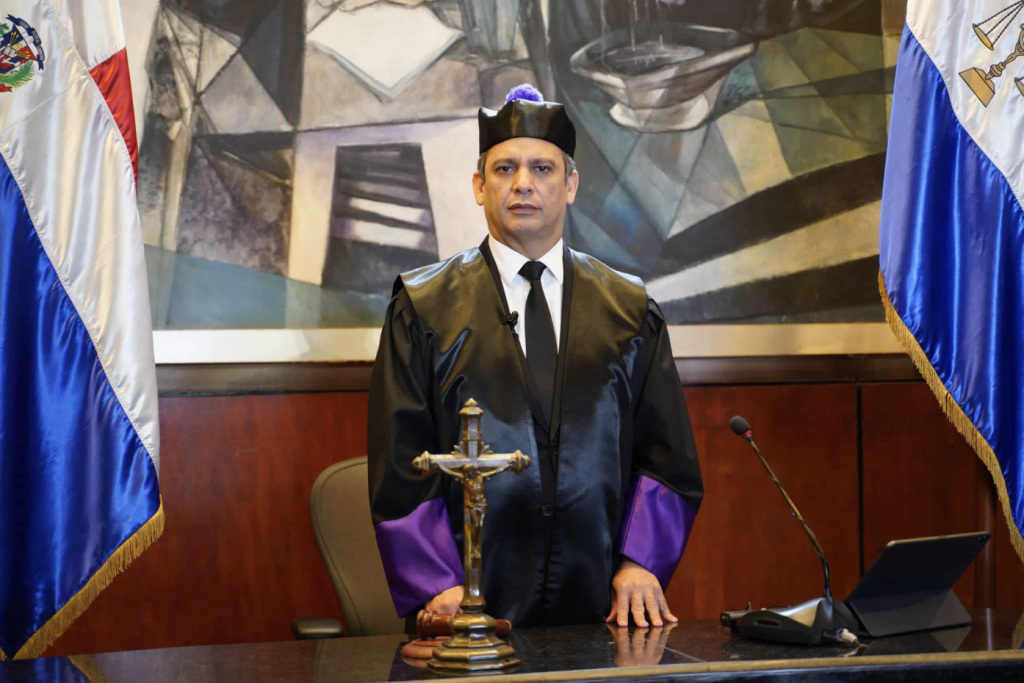
The recent publication of the Data Protection Policy document that would require the use initials to identify incriminated people by all court rulings is under the spotlight of the press in the Dominican Republic that sees this as a violation of the right to be informed of the Dominican people.
Supreme Court of Justice Luis Henry Molina says this is a form of auto-regulation of the Justice Branch of government. In defending the policies that are yet to go into effect, the president of the Supreme Court of Justice says that state prosecutors are not affected by the Supreme Court of Justice new policies. The Supreme Court of Justice nevertheless would not identify those who are incriminated by rulings when publishing this online to inform the general public.
The president of the Dominican Society of Dailies, Persio Maldonado, has said the new norms clash with freedom of expression and good journalism.
Supreme Court of Justice president, Luis Henry Molina addressed the concerns of the journalism association. In a letter to the SDD, he explained that the new Data Protection Policy is a self-regulation for the Judicial Branch and has been created in accordance with the Constitution, specifically Article 44, Section 2; Law 2-23 on Cassation; Law 172-13 on Comprehensive Protection of Personal Data, and other provisions of Dominican and international legal frameworks.
“The policy prioritizes the protection of personal data, such as health information, cases involving children, victims of gender-based violence, and individuals in vulnerable situations. It also implements the principle of data minimization and sets uniform criteria for anonymization, ensuring that individuals are not unnecessarily exposed while maintaining the comprehensibility and transparency of judicial decisions,” states the letter, noting that full decisions will continue to be available in the courts, except in cases specified by law.
Molina called for the representatives of newspapers to participate in talks on the subject.
In two editorials on 20 November 2024, Diario Libre is very critical of the new measures. Diario Libre highlights the new anonymity would protect those who violate the laws.
One Diario Libre editorial states:
“The Dominican Judiciary’s new Data Protection Policy is a direct attack on transparency and public access to information. Under the guise of protecting privacy, the policy creates a dangerous path toward judicial opacity by allowing for the arbitrary “anonymization” of crucial data at the discretion of court secretaries.
“This grants excessive power to these offices, without clear guarantees of impartiality or effective oversight mechanisms. The policy’s vague language regarding the proportionality of data treatment leaves room for arbitrary decisions, particularly in cases of high public interest such as corruption.
“The claimed balance between privacy and transparency is a weak excuse to conceal information that should be accessible to the public. Moreover, the administrative burden imposed by this policy could hinder the timely publication of court rulings.
“Rather than promoting accountability, this measure appears designed to shield the judiciary from public scrutiny.”
Another editorial signed by Benjamin Morales, titled “A Supreme Mistake” states that the obligation for journalists to not reveal who is being tried endangers freedom of the press in the Dominican Republic.
He writes:
“How will the Calamar, Coral, Antipulpo, Medusa, Odebrecht, and Tucano cases be covered?
“What would I do as a journalist if I knew that within a courtroom, a former prosecutor general, a former minister, a former presidential candidate, and a major general were being tried, but I couldn’t say it because the court established it? Will journalists be denied access to courtrooms? Will hearings no longer be broadcast? Should the right to privacy take precedence over freedom of expression? Should courts be transparent places or dark public establishments?
“Why can’t the people know that someone has been accused of a crime and is going to be prosecuted? What are we trying to hide with that? Does a regulation of the Judicial Branch oblige the silence of dependencies of the Executive Branch, such as the National Police or the Attorney General’s Office? Who benefits from this idea, the poor, the powerful, or everyone?
“How do we find out that a thief, a drug trafficker, a serial killer, or a corrupt person, for example, was found guilty or innocent? Do the right to a fair trial and the presumption of innocence give the right to judicial anonymity? Is this judicial trend correct? Why are they coming out with this now, all of a sudden, without seeking opinions?”
Read more in Spanish:
Diario Libre
Diario Libre
Diario Libre
El Nuevo Diario
Listin Diario
20 November 2024

